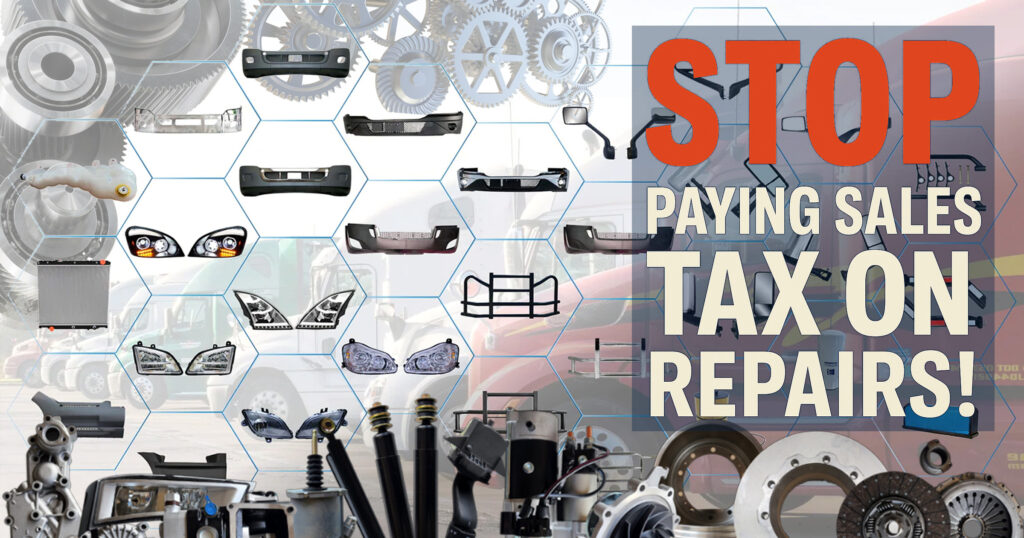The Hidden Tax You’re Probably Paying without Knowing It
The Tax Trap Millions of interstate truckers, drivers, owner-operators, and small fleet owners are unknowingly handing over extra money, sales tax on parts and repairs. Federal guidelines and state laws often exempt these costs for vehicles engaged in interstate commerce, yet millions of truckers remain in the dark, bleeding money on tires, batteries, axles, and more. This isn’t just a minor oversight, it’s a rule that can put serious dollars back in your pocket. Let’s dive into how to legally avoid it, protect your bottom line, and who to turn to for help and point you to help from the Truck Owners and Drivers Association.
What’s the Deal? Sales Tax Exemptions for Interstate Motor Carriers
U.S. tax laws, enforced at the state level, provide exemptions for sales tax on component parts, repairs, and even new vehicles when they’re used primarily in interstate or foreign commerce.
- Component parts (e.g. motors, batteries, paint, tires, axles)
- Repairs or maintenance services applying to those parts
- New rolling stock (trucks and trailers) used for interstate commerce
Why the exemption exists: The idea is straightforward—parts and repairs directly connected to interstate commerce shouldn’t be taxed by states as a way to avoid tax-layering and encourage free movement across state lines.
Key exempt items typically include:
- Component parts like motors, batteries, tires, axles, and paint.
- Repair and maintenance services on those parts.
- New rolling stock (trucks and trailers) used for interstate commerce
This stems from principles avoiding tax layering on interstate activities. States like Michigan offer exemptions specifically for rolling stock and affixed parts to interstate fleet carriers. Tennessee exempts repair parts and accessories sold to common carriers for interstate use. Kansas law covers rolling stock, parts, and items used directly in interstate commerce via certificates like ST-28J.
How to Qualify and Claim It
The process is straightforward but requires action: You must obtain and provide a sales tax exemption certificate to your vendor at purchase time.
Common certificates include:
- Kansas ST-28J Interstate Common Carrier Exemption Certificate for parts and repairs.
- Illinois Form RUT-7 Rolling Stock Certification for vehicles and parts bought after August 2017.
- Michigan Sales & Use Tax Certificate of Exemption (Form 3372) for interstate fleet carriers.
- Missouri Form 149 Sales/Use Tax Exemption Certificate, often paired with Form 5435 for common carriers.
Without these certificates presented at purchase time, sales tax applies—even retroactively in many states. Contact your state’s department of revenue to get the right form, prove your interstate operations (e.g., via ICC/MC authority or mileage logs), and present it every time you buy.
State-by-State Variations—Know the Specifics, Rules Vary, But Savings Don’t
Exemptions aren’t uniform—check your base state and where you buy parts. Here’s a snapshot:
- Florida: Partial exemptions based on interstate vs. intrastate mileage ratios for parts and installations; repairs done outside Florida aren’t taxed.
- New Jersey: Exempts commercial vehicles over 26,000 lbs used solely in interstate freight, including parts and repairs.
- New York: Exempts qualifying heavy-duty tractors, trailers, and semitrailers for interstate use, extending to repair and replacement parts.
- Ohio: Exempts vehicles primarily used for highway transportation for hire, including parts and maintenance.
- Pennsylvania: For vehicles treated as public utilities (e.g., common carriers), exemptions cover maintenance, repairs, and parts used in service.
- Louisiana: Exempts trucks over 26,000 lbs operating at least 80% in interstate commerce, including trailers.
Other states like Washington, Indiana, and Kentucky follow suit with similar rules for interstate carriers.
Why Millions of Truckers Miss Out
For most truckers, especially small fleets and independent owner-operators, every dollar counts. Yet millions of truckers, especially small fleets and independent drivers across the country are still paying sales tax on parts and repairs that could be legally exempt under interstate commerce rules. Why? The reasons are simple but costly:
- Lack of dedicated tax professionals: Unlike large carriers with accounting teams, independent drivers often don’t have experts guiding them through the maze of exemption laws.
- Patchwork of state rules: Only about two-thirds of states exempt rolling stock, and even fewer fully extend that relief to parts and repair services. Navigating these differences is confusing, especially for new operators.
- Low awareness: Many truckers are never told about these exemptions when they buy parts, and vendors rarely go out of their way to educate their customers.
- Time crunch: Between long hauls, tight schedules, and compliance demands, paperwork for tax exemptions often gets pushed aside.
The end results? Truckers are overpaying millions each year, money that should be going back into their businesses, their families, and their future.
But here’s the bigger issue: this isn’t just an individual problem—it’s an industry-wide blind spot. What truckers lack isn’t willingness, but awareness and a unified platform to make sure everyone gets the benefits they are legally entitled to.
That’s where the Truck Owners and Drivers Association steps in. Unlike big lobby groups that often put corporate interests first, Truck Owners and Drivers Association is built on the principle of “Truckers of the World, Unite!” It’s a global association for truckers, by truckers – a collective voice to cut through the red tape, educate members, and ensure no one leaves money on the table simply because they didn’t know their rights.
Truckers already prove their strength every day on the road. Imagine what happens when that same grit, unity, and cooperation are applied off the road—protecting each other from unfair costs, sharing knowledge, and building financial resilience through the Association.
Because at the end of the day, missing out on sales tax exemptions isn’t just about dollars and cents—it’s about solidarity, empowerment, and making sure truckers everywhere get the respect and fair shake they deserve.
What You Can Do Right Now
Step 1 – Get Your Certificate: Contact your state’s department of revenue or equivalent for the exemption form and verify your eligibility (e.g., ST-28J, RUT-7, Form 3372, prove 80% interstate use in states like Louisiana).
Step 2 – Present It at Purchase: Your vendor needs the certificate when you purchase. Keep digital copies handy.
Step 3 – Track Usage: Some states require you to prove your vehicle’s interstate use (e.g., Florida’s mileage ratio or Louisiana’s 80% rule). Track interstate usage to support claims
Step 4 – Review Your Past Spend: Some states allow refunds for overpaid tax. Check past invoices—maybe you can recover some overpaid tax (depending on your state’s credit/refund rules).
Reach Out for Help—Truck Owners and Drivers Association
Navigating this solo? Need assistance getting set up? The Truck Owners and Drivers Association is a great place to turn for guidance on forms, state rules, and advocacy for truckers’ rights. Visit jointoda.com or check their social channels for association.
#JoinTODA to unite with fellow drivers and fight for fair treatment.
Final Haul: Keep That Hard-Earned Cash on the Road
Don’t let repairs’ sales tax drag down your profits “Millions in tax exemptions, one certificate away” but you don’t have to.
Don’t let paperwork stop you from saving. As of September 2025, these exemptions are still in play across many states. Grab that certificate, save on parts, and drive smarter. Your wallet (and rig) will thank you!


